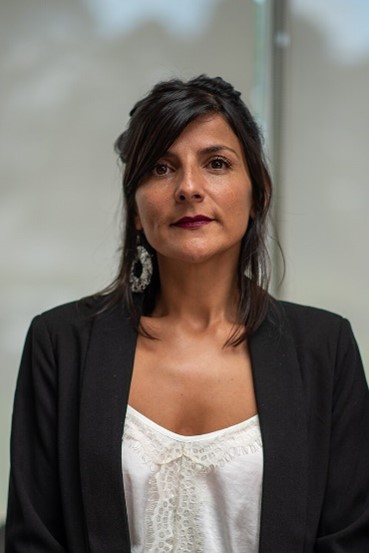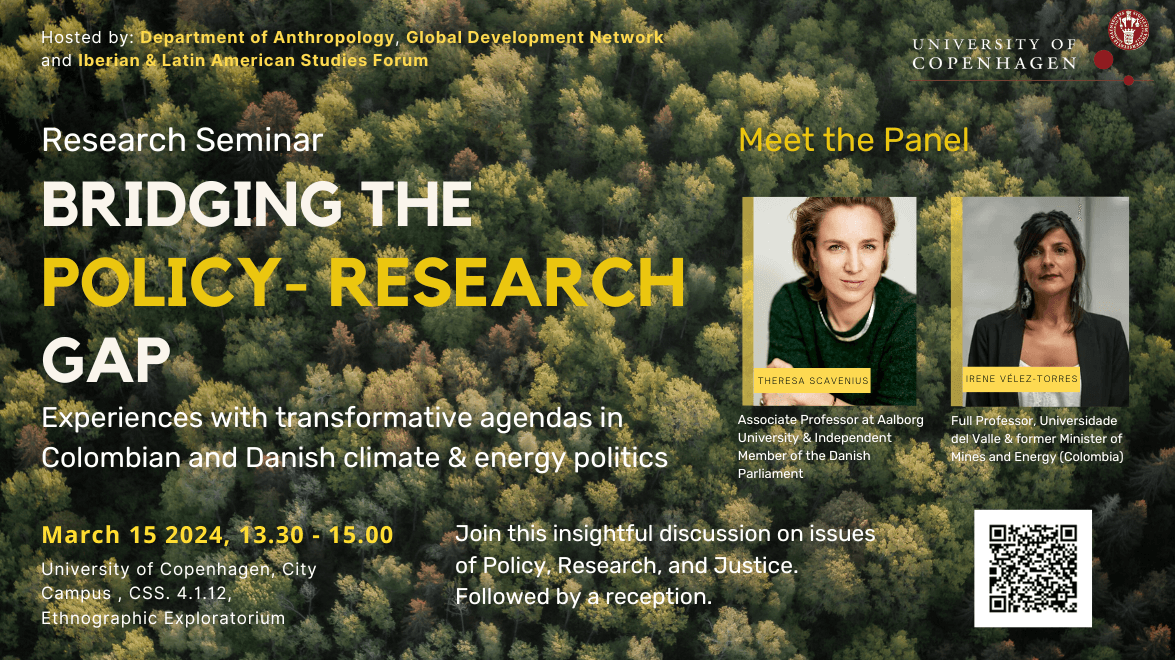Research Seminar: Bridging the Policy-Research gap
Experiences with transformative agendas in Colombian and Danish climate & energy politics
Seminar Description
Anthropologists, Geographers and global development scholars have long been concerned with how to mobilise research for the good of society. This resonates with current research policy agendas, where scholars are increasingly encouraged to engage with society and create impact. Yet, what happens when social science researchers bring transformative visions into the political sphere? What challenges do they encounter when seeking to turn research-based insights into concrete policy and change in society? And how can academia as well as society in general support and enable a dynamic and constructive relation between research and policy for the construction of, or transitioning to, just and sustainable futures?
This research seminar is a conversation between two researchers-turned-politicians, Irene Vélez-Torres and Theresa Scavenius, who in each their way have sought to bring their research-based vision for a just transition into policy-making contexts. They will share their insights from bridging the gap between research and policy, and engage in a dialogue about how different academic disciplines can contribute to the construction of just and livable futures.
We envision a dialogue in an informal setting with 45 minutes conversation between the panelists moderated by Associate Professor Stine Krøijer, followed by a 15 minutes’ break and 30 minutes Q&A from the audience. After the event there will be a small reception.
Panel Speakers

Irene Vélez-Torres is Professor and activist researcher at Universidad del Valle, Colombia. With an interdisciplinary background in Political Geography (PhD, University of Copenhagen), Cultural Studies (MA, Universidad Nacional de Colombia) and Philosophy (BA, Universidad Nacional de Colombia), she examines the capitalist expansion of agrarian and mining frontiers, and its intersections with historical processes of gendered, ethno-racial and class-based discrimination. In 2022-2023, she was Minister of Mines and Energy in the first left-wing government in Colombia, leading a vision for a democratic and just energy transition seeking to overcome existing extractivist logics in the country. She is a Fulbright Scholar and has been visiting scholar at the Centre for Social Studies at the University of Coimbra (PT), Clemson University (USA), the Institute for Social Studies of Rotterdam University (NL), and Loughborough University (UK).

Theresa Scavenius holds a PhD in political science and is Associate Professor at Aalborg University, Denmark. For the past 13 years, most of her research has been devoted to the issue of climate change. She has among others published the books: Political Responsibility for Climate Change (Routledge) and together with Steve Rayner, Institutional Capacity for Climate Change Response (Routledge). Her newest book in Danish Klimastaten (The Climate State) explains why the current competitive state is incapable of conducting climate politics and explores how the state may think and act more like a climate state. She is currently working on a research project on the epistemic geographies of the IPCC (Intergovernmental Panel on Climate Change). Besides her research Scavenius has been politically engaged in the green parties Alternativet and Momentum (2016-2022) and is now an independent member of the Danish Parliament.
Seminar Details
When: 15 March 2024 13.30-15.00
Where: University of Copenhagen, City Campus, CSS. 4.1.12, Ethnographic Exploratorium
Hosts: Department of Anthropology, Global Development Network and Iberian & Latin American Studies Forum, University of Copenhagen

